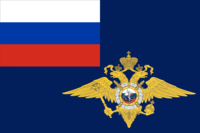MVD
| Министерство внутренних дел Российской Федерации Ministerstvo vnutrennih del Rossijskoj federacii |
|

Ministry emblem
|
|

Flag of the Ministry of the Interior
|
|
 Ministry of Internal Affairs (Moscow) |
|
| Agency overview | |
|---|---|
| Formed | March 1802 |
| Preceding agency |
|
| Jurisdiction | President of Russia |
| Headquarters | Zhitnaya St. 16, Moscow, Russia Coordinates: 55°43′51″N 37°36′50″E / 55.73083°N 37.61389°E |
| Employees | 907,630 (2012) |
| Annual budget | 1192.2 billion rouble (FY 2011) |
| Minister responsible | |
| Child agency |
|
| Website | en |
The Ministry of Internal Affairs of the Russian Federation (MOI, Russian: Министерство внутренних дел, МВД, Ministerstvo Vnutrennikh Del, MVD) is the interior ministry of Russia. Its predecessor was founded in 1802 by Alexander I in Imperial Russia. The Ministry is headquartered in Moscow.
The current Minister of Internal Affairs is General of Police Vladimir Kolokoltsev, who was the Moscow Police Commissioner between 2009 and 2012.
Created by Alexander I on 28 March 1802 in the process of government reforms to replace the aging collegia of Peter the Great, the MVD was one of the most powerful governmental bodies of the Empire, responsible for the police forces and Internal Guards and the supervision of gubernial administrations. Its initial responsibilities also included penitentiaries, firefighting, state enterprises, the state postal system, state property, construction, roads, medicine, clergy, natural resources, and nobility; most of them were transferred to other ministries and government bodies by the mid-19th century.
As the central government began to further partition the countryside, the ispravniks were distributed among the sections. Serving under them in their principal localities were commissaries (stanovoi pristav). Ispravniki and pristav alike were armed with broad and obscurely-defined powers, which, combined with the fact that they were for the most part illiterate and wholly ignorant of the law, formed crushing forces of oppression. Towards the end of the reign of Alexander II, the government, in order to preserve order in the country districts, also created a special class of mounted rural policemen (uryadniks, from uriad, order), who, in a time without habeas corpus, were armed with power to arrest all suspects on the spot. These uryadniks rapidly became the terror of the countryside. Finally, in the towns of the rural countryside, every house was provided with a "guard dog" of sorts, in the form of a porter (dvornik), who was charged with the duty of reporting the presence of any suspicious characters or anything of interest to the police.
...
Wikipedia
